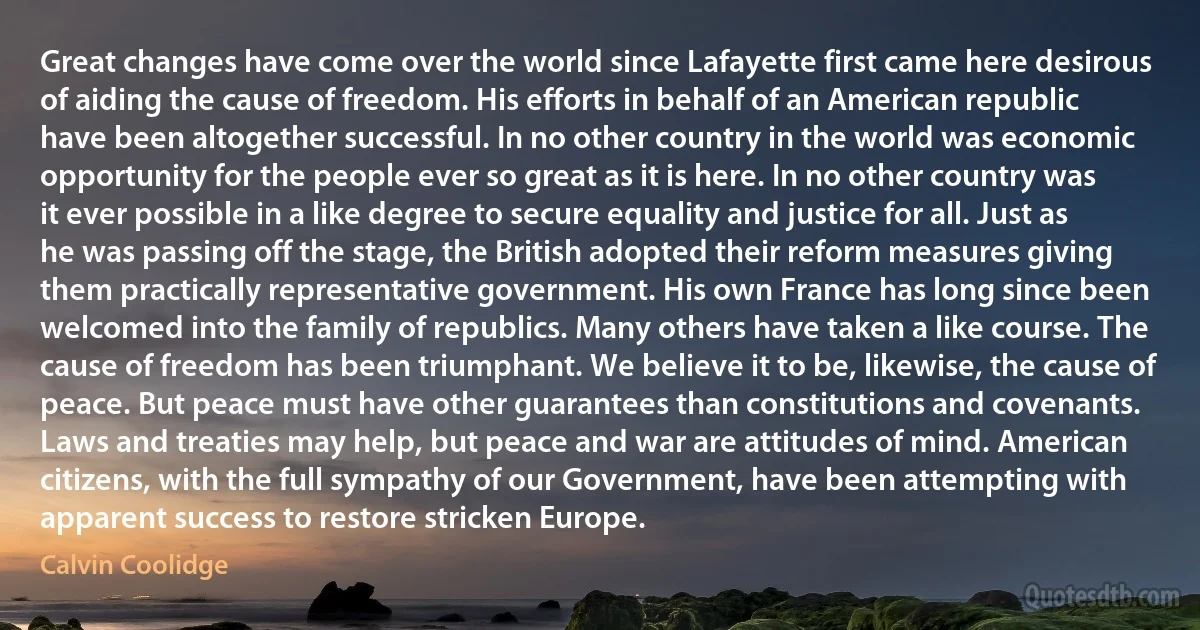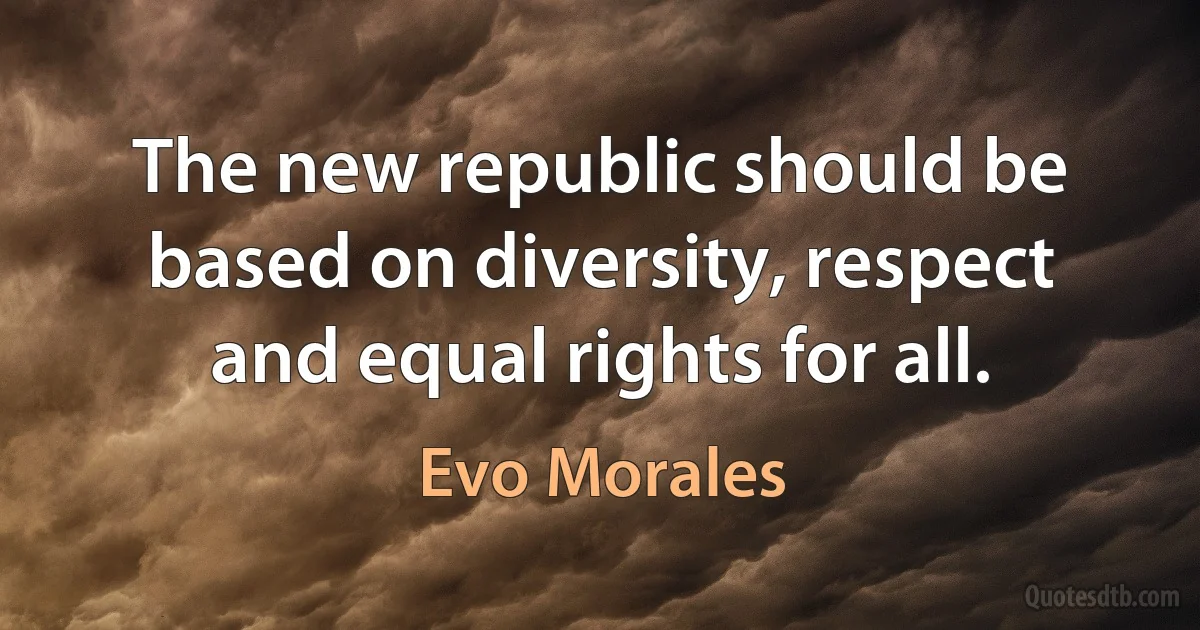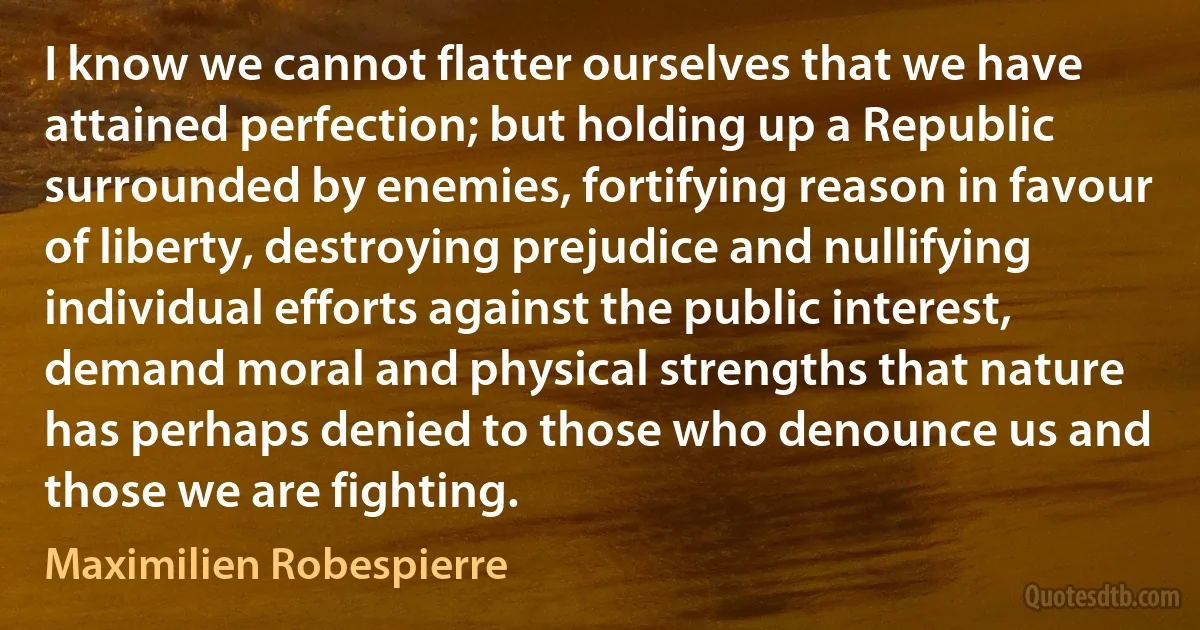Republic Quotes - page 13
Let us all, then, join their comrades who live, in spreading flowers over the graves of these dead Federal soldiers, before the whole American people, as a peace offering to the nation, as a testimonial of our respect for their devotion to duty, and as a tribute from patriots, as we have ever been, to the great Republic, and in honor of the flag against which we fought, and under which they fell, nobly maintaining the honor of that flag. It is our duty to honor the government for which they died, and if called upon, to fight for the flag we could not conquer.

Nathan Bedford Forrest
Is it true what Contreras testified before the courts, that the president of the junta and later the president of the Republic was the direct head of DINA?
I don't remember, but it is not true. It is not true and if it was, I don't remember. Contreras liked to cajole, wrap around his boss. Contreras gave the orders. It was he who managed the institution.

Augusto Pinochet
I met the New Passion, then, as democracy, as political enlightenment and the humanitarianism of happiness. I understood its efforts to be toward the politicization of everything ethos; its aggressiveness and doctrinary intolerance consisted – I experienced them personally – in its denial and slander of every nonpolitical ethos. "Mankind” as humanitarian internationalism; "reason” and "virtue” as the radical republic; intellect as a thing between a Jacobin club and Freemasonry; art as social literature and maliciously seductive rhetoric in the service of social "desirability”; here we have the New Passion in its purest political form as I saw it close up. I admit that this is a special, extremely romanticized form of it.

Thomas Mann
The great paradox of Australian history is that what started out as a colony populated by people whom Britain had thrown out proved to be so loyal to the British Empire for so long. America had begun as a combination of tobacco plantation and Puritan utopia, a creation of economic and religious liberty, and ended up as a rebel republic. Australia started out as a jail, the very negation of liberty. Yet the more reliable colonists turned out to be not the Pilgrims but the prisoners.

Niall Ferguson
Mr. Lincoln looked down on the poor creatures at his feet; he was much embarrassed at his position. 'Don't kneel to me,' he said. 'That is not right. You must kneel to God only, and thank him for the liberty you will hereafter enjoy. I am but God's humble instrument; but you may rest assured that as long as I live no one shall put a shackle on your limbs, and you shall have all the rights which God has given to every other free citizen of this Republic.

David Dixon Porter
When confederation is realized, and the ideologies of North and South are propagandized in the course of free intercourse between the two sides, the Republic [DPRK] will not be affected in the slightest, because it is a unified state. But the South is an ideologically divided, liberal country, so if we extensively propagate Juche Thought and the superiority of our system we can win over at least half its citizens. As of now South Korea is twice our size in population terms. But once we win over half the South's people in a confederation, we will be two parts to the South's one. We would then win either a general election or a war.

Kim Il-sung
Certainly the people's insistence that their candidates should present themselves ungirt and without a tunic had nothing to do with any suspicion of bribery, for it was not until long afterwards that the abuse of buying and selling votes crept in and money began to play an important part in determining the elections. Later on, however, this process of corruption spread to the law courts and to the army, and finally, when even the sword became enslaved by the power of gold, the republic was subjected to the rule of the emperors. For it has rightly been said that the man who first offers banquets and bribes to the people is the first to destroy their liberties.

Plutarch
In place of a slave colony, we want a restored German national state. The state is not an end in itself for us, but rather a means to an end. The true end is the race, the sum of all the living, creative forces of the people. The structure that today calls itself the German republic is not a way to maintain our racial inheritance. It has become an end in itself with no real connection to the people and their needs.

Joseph Goebbels
And how will the New Republic treat the inferior races? How will it deal with the black? how will it deal with the yellow man? how will it tackle that alleged termite in the civilized woodwork, the Jew? Certainly not as races at all. [...] And the Jew also it will treat as any other man. It is said that the Jew is incurably a parasite on the apparatus of credit. If there are parasites on the apparatus of credit, that is a reason for the legislative cleaning of the apparatus of credit, but it is no reason for the special treatment of the Jew. If the Jew has a certain incurable tendency to social parasitism, and we make social parasitism impossible, we shall abolish the Jew, and if he has not, there is no need to abolish the Jew.

H. G. Wells
For Stalin to have complete centralized power in his hands, he found it necessary to physically destroy the second largest Soviet republic, meaning the annihilation of the Ukrainian peasantry, Ukrainian intelligentsia, Ukrainian language, and history as understood by the people; to do away with Ukraine and things Ukrainian as such. The calculation was very simple, very primitive: no people, therefore, no separate country, and thus no problem.

James Mace
The question really arises is it a republic if you can keep it, question have we kept it? And the answer is no! No we have not kept it. Since 2001 we have in effect an elected monarchy. And ah, meaning a country which Nixon's view 'when a president does it, it is legal'. The president says it's not illegal. That is the attitude long after Nixon of John Yoo, who was the advisor to George W. Bush, of David Addington, Bush Cheney's legal advisor. Essentially there are no limits on presidential power except those which he chooses to put on himself. Obama following on, has in effect decriminalized torture which is as illegal and criminal as anything can be under international law and domestic law, a number of domestic laws and international laws, which we have ratified to investigate, and follow-up if there is any credible charge. Obama has chosen not to investigate or indict any higher up for that process of torture.

Daniel Ellsberg
I. We require of you, as the first servant of the Republic, charged especially and preeminently with this duty, that you EXECUTE THE LAWS. Most emphatically do we demand that such laws as have been recently enacted, which therefore may fairly be presumed to embody the present will and to be dictated by the present needs of the Republic, and which, after due consideration have received your personal sanction, shall by you be carried into full effect, and that you publicly and decisively instruct your subordinates that such laws exist, that they are binding on all functionaries and citizens, and that they are to be obeyed to the letter.

Horace Greeley
It may be said that the conditions are glorious for the French Republic: it must be confessed that they are; and there is not a Briton but who ought honestly to rejoice that such is the fact. The people of France resisted, as they ought to do, the whole combination of powers who would have imposed upon them a constitution contrary to their own will. Their's was the cause of liberty-the cause of mankind at large. They had every obstacle to oppose which imagination can suggest-but they have triumphed over such obstacles-their cause has been crowned with an everlasting triumph...We have not, I acknowledge, obtained the objects for which the War was undertaken-so much the better-I rejoice that we have not. I like the Peace the more on this very account.

Charles James Fox
Louis cannot be judged; either he is already condemned or the Republic is not acquitted. Proposing to put Louis on trial, in whatever way that could be done, would be to regress towards royal and constitutional despotism; it is a counter-revolutionary idea, for it means putting the revolution itself in contention.

Maximilien Robespierre
But there do exist, I can assure you, souls that are feeling and pure; it exists, that tender, imperious and irresistible passion, the torment and delight of magnanimous hearts; that deep horror of tyranny, that compassionate zeal for the oppressed, that sacred love for the homeland, that even more sublime and holy love for humanity, without which a great revolution is just a noisy crime that destroys another crime; it does exist, that generous ambition to establish here on earth the world's first Republic.

Maximilien Robespierre
We wish in our country that morality may be substituted for egotism, probity for false honour, principles for usages, duties for good manners, the empire of reason for the tyranny of fashion, a contempt of vice for a contempt of misfortune, pride for insolence, magnanimity for vanity, the love of glory for the love of money, good people for good company, merit for intrigue, genius for wit, truth for tinsel show, the attractions of happiness for the ennui of sensuality, the grandeur of man for the littleness of the great, a people magnanimous, powerful, happy, for a people amiable, frivolous and miserable; in a word, all the virtues and miracles of a Republic instead of all the vices and absurdities of a Monarchy.

Maximilien Robespierre
Since virtue and equality are the soul of the republic, and that your aim is to found, to consolidate the republic, it follows, that the first rule of your political conduct should be, to let all your measures tend to maintain equality and encourage virtue, for the first care of the legislator should be to strengthen the principles on which the government rests. Hence all that tends to excite a love of country, to purify manners, to exalt the mind, to direct the passions of the human heart towards the public good, you should adopt and establish.

Maximilien Robespierre
The new governmental reason does not deal with what I would call the things in themselves of governmentality, such as individuals, things, wealth, and land. It no longer deals with these things in themselves. It deals with the phenomena of politics, that is to say, interests, which precisely constitute politics and its stakes; it deals with interests, or that respect in which a given individual, thing, wealth, and so on interests other individuals or the collective body of individuals. ... In the new regime, government is basically no longer to be exercised over subjects and other things subjected through these subjects. Government is now to be exercised over what we could call the phenomenal republic of interests. The fundamental question of liberalism is: What is the utility value of government and all actions of government in a society where exchange determines the value of things?

Michel Foucault



